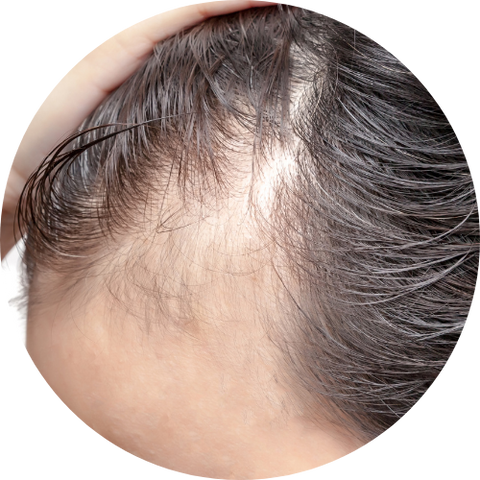
The life cycle of the hair.
On the whole of our hair, 90% is in the growth phase and 10% in the fall phase. The life cycle of a hair isabout 5 years and is made up of 3 phases
The Anagène phase: growth phase
Hair is born in hair follicles or pilot-sebaceous follicles. These are small bags or bulbs that contain sebum and the hair matrix. This phase is the longest and can last for several years.
The catagen phase: growth stop phase
The cells cease to multiply and the base of the hair dissociates from the follicle. The duration of this phase is a few weeks to a few months.
Telogen phase: fall phase
The hair arrives on the surface of the scalp And gradually ends up falling. A new hair is born in the hair follicle.
Losing a hundred hair a day is not abnormal.
But, if the fall has arrived suddenly and suddenly, it is a reactive hair loss that can follow a health problem or a curative treatment.
5 health problems that cause hair loss.
First of all, if the symptoms are important, make an appointment with your general practitioner. He is the guarantor of your health and well-being and will be able to advise you.
1. The alopecia

Also called baldness, it is the partial or total loss of hair and/or hair. This condition can affect the scalp and different parts of the body.
Hormonal causes
- Androgenetic alopecia
Androgenetic alopecia is a gradual loss of hair due to the influence of male hormones. It is the most common cause of hair loss and is more widespread in men than in women. In most cases, causes are linked to genetic factors.
- Post-menopausic alopecia
This is the most frequent cause of baldness in women. It occurs after menopause, when the protective role of female hormones has disappeared. The hair becomes more fragile and its lifespan decreases.
- Other forms
Chronic stress can also cause alopecia
Nutritional causes
Hair loss can be caused by iron deficiencies, copper, zinc, silicon, vitamins B. This kind of hair loss would reach around 20 % of people practicing a moderate to severe diet. However, it is more often associated with bolimia or anorexia problems. Most often, the person will find his hair after a period of time that can go up to two years.
The excavation
Helping is a disease resulting in hair loss or hair on delimited areas. The evolution is made towards improvement or healing in almost half of the cases in a month but the recurrences are frequent.
2. COVID-19
A study conducted in the United States out of 1,500 people reveals that one in three people reports having suffered a substantial hair loss during the disease. However, the COVID-19 itself would not be the direct cause, but rather the stress suffered by the body, to fight against the virus. This phenomenon is called "telogen effluvium". It causes a capillary disruption which generally occurs 3 months after being sick or after having experienced a stressful situation.
3. Chemotherapy following cancer
Chemotherapy is a treatment for cancer based on the use of drugs. This treatment aims to destroy or prevent cells that quickly divide from multiplying. This is the case of cancer cells, but also those of the hair bulb. Chemotherapy will therefore act and cause the destruction of these cells and lead to a massive fall in hair, generally 2 to 3 weeks after the start of treatment.

4. Diabetes
A unbalanced and unstable diabetes can be responsible for degradation, even hair loss. In question, the blood sugar level. When this rate is unbalanced, it prevents blood from properly irrigating the cells of the hair follicle, which is found in deficiency of vital nutrients. A situation that can lead to major hair problems, especially if the crises are frequent.
5. Thyroid problems
The thyroid is an endocrine gland, that is to say it secretes and pours hormones directly into the blood system. By regulating certain hormones, the thyroid also exercises a vital role for the hair. When it is too little active (hypothyroidism), it can make your hair dry, brittle and fragile, and slow down their growth. On the other hand, if it is too active (hyperthyroidism), it can cause significant hair loss. Following the modification of the L-Tyroxine formula in 2017, it has been found that many patients are suffering more and more from more significant hair loss.
What cure to use after a hair loss caused by health concern?
The cure Essential Care is recommended in the event of hair loss caused by a excavation, COVVI-19, diabetes, chemotherapy, food modification or simply for preventive action during the change of season.
The cure Essenail Care And its 16 vitamins and minerals will improve, strengthen and maintain hair health by bringing all the nutrients necessary for hair health and promoting the natural growth of hair.
The cure Intense repair is recommended in the event of hair loss caused by hormonal imbalance such as androgenetic alopecia, post-Menopausic alopecia, chronic stress or a thyroid problem. It restores the health of damaged hair, slows down the fall and boosts the regrowth.
The cure Intense repair Bring all the nutrients that the hair needs as well as plant extracts recognized for their benefits and thus improving the hormonal balance of men and women.




